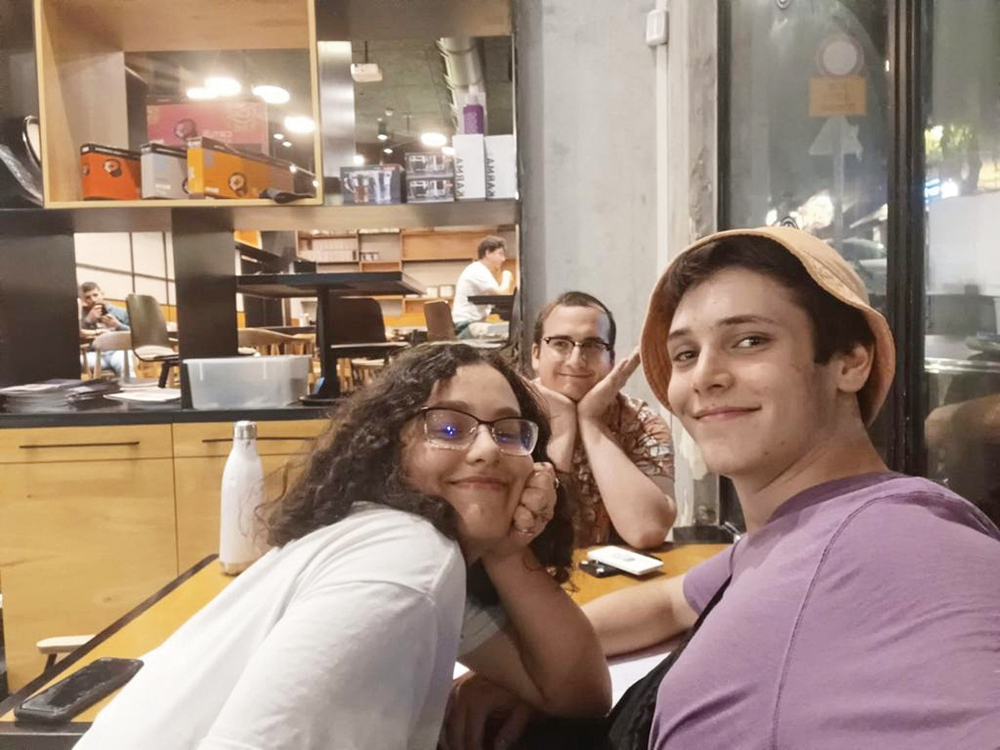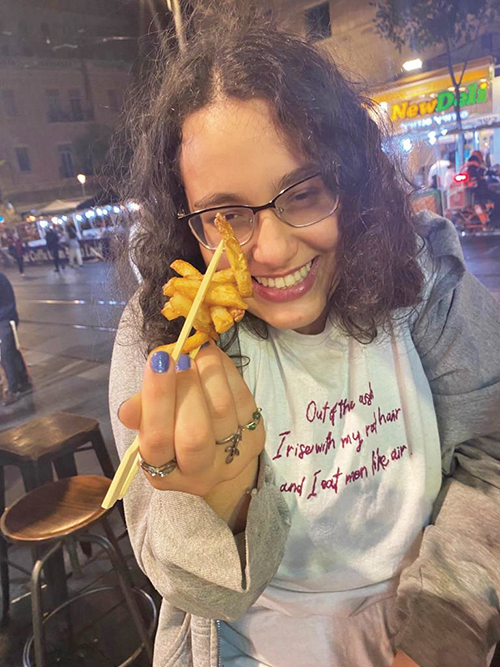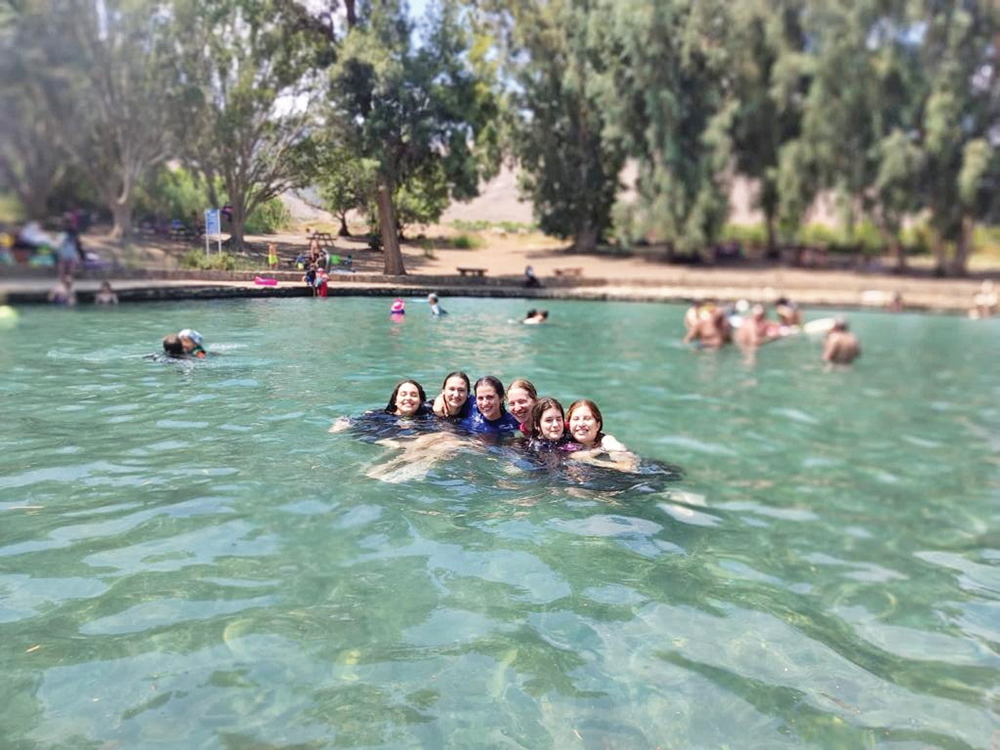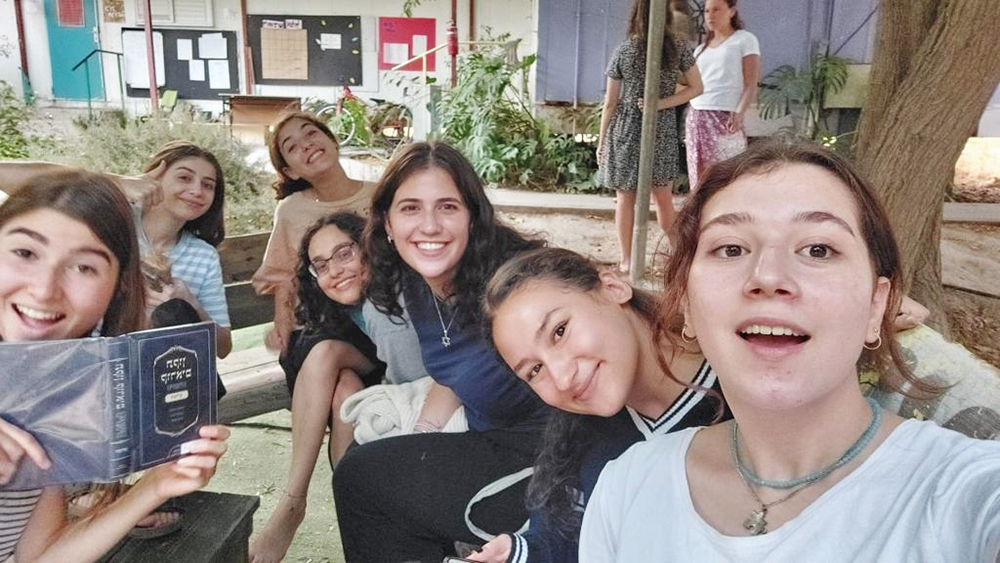
Nurit Schlosberg grew up in Teaneck, attending Congregation Beth Shalom and Netivot Shalom with her family. Nurit was educated at Ben Porat Yosef and the Idea school before heading off to Midreshet Ein HaNatziv, and will be continuing her intellectual journey at Binghamton next fall.
Why were you drawn to Ein HaNatziv and what makes it different from all the other programs you considered?
Ein HaNatziv is very different. For one, it is mainly an Israeli program with only four other Americans. There are only twenty shana aleph girls, mostly Israelis preparing for the army. I was instantly drawn to it because all the classes are in Hebrew and I knew I would have Israeli roommates. I really wanted to become fluent in Hebrew and now that I have to talk in Hebrew every day, my Hebrew has really been improving.
How do you think Ein HaNatziv fits your personality and your own philosophical outlook?
Ein HaNatziv is about giving women the chance to expand their learning in a more open-ended manner. You can work with the teachers and find what works for you. I’m not as traditional and Ein HaNatziv allows me to express that. Everyone is able to find their Judaism without feeling restricted to a single path.

What is your favorite class that you attend in Ein HaNatziv?
Tanach. It’s a subject I am familiar with so it’s a lot easier to understand. When I don’t have to spend so much energy on understanding the shiur, it makes it much easier to appreciate the subject. Chassidut has been fascinating but I’m having more of a difficult time following along. I also love Gemara, even if I do have trouble sometimes understanding the class.
Is there any particular teacher that you particularly connect with?
Since the classes are in Hebrew I don’t always understand everything. So liking teachers has been a mixture between them speaking slow enough for me to understand, but still engaging enough that I want to listen. Gemara with Ramit Ya’arah has been great. She’s so engaging but also understanding of my needs and does not talk too fast. We have chavruta learning also, and that has been really enjoyable.
What’s a goal you had coming into the year?
Well, obviously I wanted to expand my Hebrew vocabulary, but I also wanted to learn more Gemara. I know that in college I will not have as many opportunities to learn Gemara, so I wanted to give it one more push.
What were your expectations going into Ein HaNatziv and how have they differed from your actual experience?
I knew I would have to get used to teachers speaking only Hebrew but I thought it would be easier than it actually is. It isn’t like elementary school where the Hebrew was simple. We are adults, so the spoken Hebrew is more advanced. I also knew I would have Israeli roommates but I didn’t know what to expect on how we would interact with the kibbutz. And [since] our classes at the Idea School were more interactive,getting used to a lecture style has been hard. But I’ve been enjoying the challenges and it’s not too jarring.

What has the kibbutz been like?
It’s been great! I’ve met so many cool people who hosted me for Shabbat! This past Shabbat I was the only one from the midrasha who stayed in; everyone else left. So I ate my Shabbat meals with a local family and it was amazing.
Before the [current] conflict there were discussions about us possibly volunteering on the kibbutz, but that has not really happened yet because the current situation messed up all the plans. But I help out where I can.
What have you done to help out?
I’ve babysat for a family and spent time working in the local school. It’s been kinda hard to communicate with the little kids with my limited Hebrew but I am super happy to help out.
Outside of learning, what else do you enjoy doing in Israel?
I really like to visit the kibbutz’s petting zoo and say hi to all of the animals. I have experience working with horses so I volunteered to help if they needed me. I have a lot of hobbies, but I also like to walk around the kibbutz and pet the cats. It has also been really fun to visit the different restaurants in Jerusalem.
What does a typical Shabbat look like for you, especially with the Israel-Hamas conflict?
I used to go to a friend or family for Shabbat. I’ve spent Shabbat in my savta’s apartment in Raanana, with my cousins in Lod, and then with a friend from the midrasha, and more cousins for Sukkot. But I came back to the midrasha on Friday, October 6th and since then I haven’t left the kibbutz because my parents don’t think it’s safe.
What are your plans for the next few weeks?
I am definitely not going back to America unless things get way worse. My parents paid for this year and I don’t want to waste it. I also don’t want to run away just because things are somewhat harder. I came here to learn and do certain things and I want to accomplish them. I’m not going to run away and waste my year just because things are scarier.

Is there anything you want to say to people reading this at home?
I’ve been thinking a lot about a quote by Marjane Satrapi: “The world is not divided between East and West. You are American, I am Iranian, we don’t know each other, but we talk together and we understand each other perfectly. The difference between you and your government is much bigger than the difference between you and me.”
A lot of people are suffering right now. I keep seeing rocket alerts for places where my family is and it is really scary. But I don’t want to be angry at the innocent people who suffer because of their government. Fear and hate do not solve problems. Do not dehumanize people. We are all just trying to survive.
Sam Savetsky of Bergenfield is a shana bet student currently studying at Yeshivat Migdal HaTorah in Modi’in.









